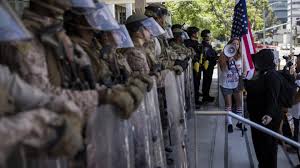On September 8, 2025, the United States Supreme Court issued a 6-3 ruling allowing federal immigration enforcement operations in Southern California to resume, overturning a previous federal judge’s order that had restricted such raids. This decision has sparked heated debates over the balance between national security and the protection of civil liberties, particularly among Latino and immigrant communities.
The ruling lifts an injunction issued by U.S. District Judge Maame Ewusi-Mensah Frimpong in July 2025, which had limited Immigration and Customs Enforcement (ICE) officers from conducting stops without “reasonable suspicion” of undocumented status. The judge’s order prohibited stops based solely on factors such as race, language, or presence at immigrant gathering spots.
Supreme Court Justice Brett Kavanaugh, writing for the conservative majority, emphasized that while ethnicity alone cannot justify a stop, it can be considered as a relevant factor alongside other significant evidence. He argued that the lower court’s restrictions imposed undue limits on the ability of enforcement agents to carry out their duties.
The decision was met with strong dissent from the Court’s liberal justices. Justice Sonia Sotomayor highlighted documented instances of Latino individuals being subjected to humiliating treatment such as being seized and restrained simply because of their appearance or occupations. She warned that this ruling essentially permits racial profiling.
The Department of Homeland Security hailed the ruling as a victory for public safety, affirming its commitment to removing criminal undocumented individuals. Meanwhile, immigrant rights groups condemned the verdict, calling it a green light to racial profiling and a threat to immigrants’ constitutional rights.
This ruling comes amid intensifying political debates in the U.S. about immigration enforcement policies and the legal boundaries of police powers.
A federal district court is scheduled to hear further arguments on September 24, 2025, to consider whether a preliminary injunction should be reinstated based on additional evidence challenging enforcement tactics.
The Supreme Court’s ruling has renewed public focus on how immigration laws are enforced and the ongoing struggle to protect civil rights in diverse communities.
More than news- Its Icegate

